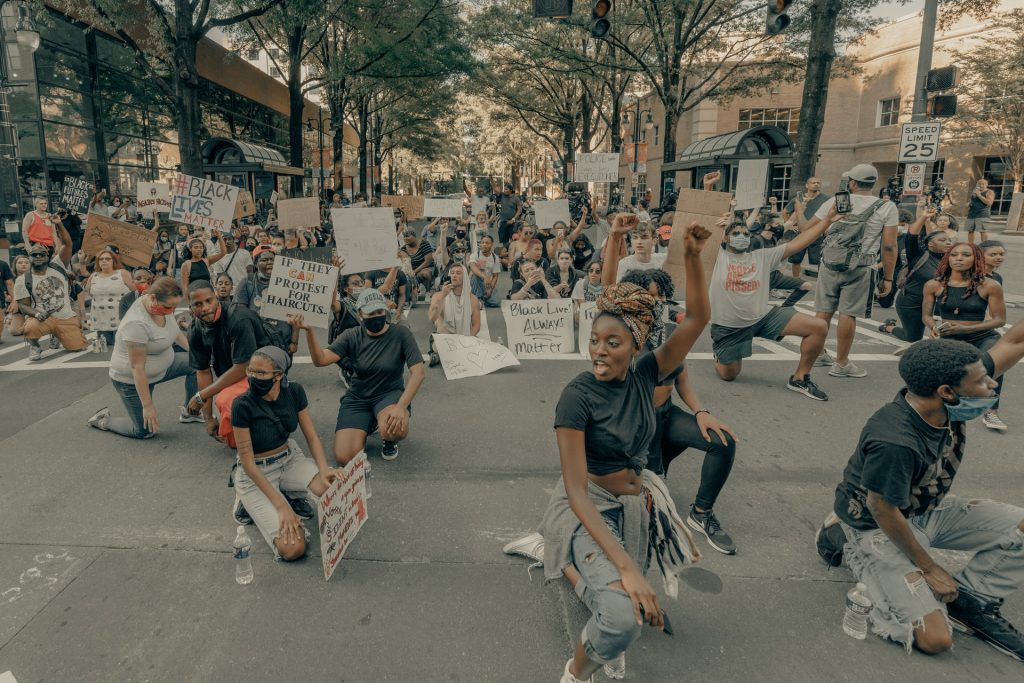On a recent still night as I watched global protests on TV against the killing of Black people, my heart caught a scene that profoundly crushed me. It occurred over a few seconds and my guess is that it was not repeatedly publicized.
The killing of innocent and defenseless Black people is not new, it’s more public. In my elder body, I have seen worse, and so have my ancestors. With the flash cards of our news cycles, memories are short, and minds distracted. Some of you may have forgotten how blatantly racist the majority senate was when President Obama was in office, and how this continues with even more force, fury, and fear. A lot of white folks in power never got over Obama and his family occupying the White House.
You have to admit—and I know many of you are doing so loudly—that there is something about a White police officer lynching by knee a defenseless Black man who is using his last breath to call to his mama, that rips at the soul of Black people and reveals the soullessness of this nation. This public killing, so normalized, all on the hills of White vigilantes chasing down and killing an innocent and defenseless Black man while jogging. Every time I see a white person jogging, I scream inside: Why can’t my people be carefree? There is so much Black harm, so many Black killings, and so much grief. I write to you on Juneteenth, a date marked for when Black people annually celebrate the ending of chattel slavery, only to continue to witness modern-day expressions of violent and death.
Back to this video clip of the protesters that cracked me wide open—a scene I could have easily missed had I chosen to brush my teeth.
A Black man, maybe 24—the age of my grandson—short, round body, dreadlocks, right hand gripping a baseball bat, walking with increasing intensity toward the window of a retail store. Then the most unexpected and amazing thing happened. Black protestors surrounded him, affirming him with hopeful chants, and encouraging him to join them in a peaceful protest. It took a few moments, but then he surrendered to their care. I sensed that perhaps his deeper wish had been met in that moment: to be seen, to have the weight of his rage shared, and to be cared for. Maybe he even glimpsed that while he could die that day, it would be with a softer heart.
Day to day I had been coping reasonably well, maintaining a steady mindfulness practice and open protest, supporting coaching clients, community, and family back off their ledges. But in this moment—in this blink of an eye, this exhale, I was gutted in grief. What got me most was that I recognized myself in this young man—that part of me that feels insanely enraged, weary, and longing to call mama. I recognized the power of being seen in my suffering, and to surrendering to care—something I had denied needing.
I found myself sharing this experience with my Black Wisdom Circle last week only to realize that they were the peaceful protestors surrounding me in compassionate presence, witnessing my trembling voice, grimacing face, tight fists, and raw rage; holding my grief and sadness until it dissolved; without interruption, just care. Within a few moments, I felt release, more spacious, and reposed.
I touched a deeper longing that many Black people share: to be seen by each other, reassured, and surrounded in loving care—this, to me, is the healing meaning of Juneteenth! This we can only give to ourselves.
***
This article was originally published as “Black Wisdom: A Reflection on Juneteenth” on Ruth King’s website.
Thank you for subscribing to Tricycle! As a nonprofit, we depend on readers like you to keep Buddhist teachings and practices widely available.
